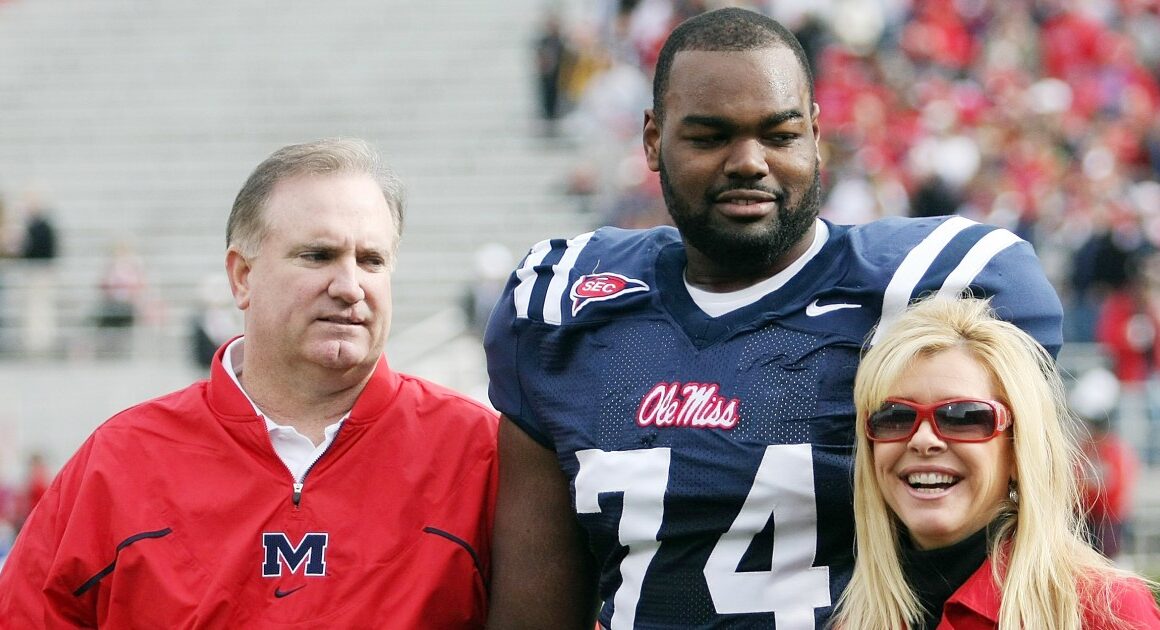Former NFL star Michael Oher has broken his silence about the lawsuit he filed last year accusing Leigh Anne and Sean Tuohy of deceiving him into a conservatorship and unfairly profiting from the book and movie “The Blind Side,” which centered on the couple’s relationship with him.
I n an in terview published in The New York Times Magazine on Sunday, Oher lamented that the movie, released in 2009 just two months into his first NFL season, stripped his true identity.
“That’s my heartbreak right there,” Oher said. “It was as soon as I got there, I was defined.”
In a lawsuit that made headlines last August, Oher alleged that the Tuohys lied about having adopted him and instead placed him into a conservatorship that gave them control over his finances and major life decisions. He also accused them of excluding him from the money they made from “The Blind Side.”
A Tennessee judge swiftly ended the conservatorship, but the rest of the lawsuit has continued, with the Tuohys denying Oher’s accusations and alleging that he received more than $138,000 in proceeds from the book and the movie.
Based on Michael Lewis’ 2006 book, “The Blind Side” earned Sandra Bullock an Academy Award for her portrayal of Leigh Anne and was nominated for best picture. However, both narratives largely left out Oher’s perspective and instead leaned into what have been called white savior tropes in which the Tuohy couple rescued a poor and hopeless Oher.
Oher criticized the film, especially for its disparaging depiction of him as unintelligent and clueless, including about football, which he said led the NFL to wonder whether he could “read a playbook.”
While the movie and the book suggest Oher knew little about football when he joined a nearly all-white private high school, a Memphis newspaper named him to the All-Metro team that season. Oher kept a clipping of the paper on his phone as proof that he was recognized for his talent before the Tuohys entered his life.
Oher pointed out another similar discrepancy between his narrative and the Tuohys’: While the Tuohys claimed they took him in during the spring of his junior year, he remembers moving in with them during the summer, which would mean he had already been named the top college football recruit in the country before he began living in the Tuohys’ home.
Oher’s reaction to first watching the movie was bewilderment, he told the magazine.
“It seemed kind of funny to me, to tell you the truth, like it was a comedy about someone else,” he said, expressing fear that public perceptions of him based on the movie might affect his children. “If my kids can’t do something in class, will their teacher think, ‘their dad is dumb — is that why they’re not getting it?’”
Despite his grievances about what he says is the Tuohys’ misuse of his image, Oher described having fond memories of his time with them and acknowledged that others might view his actions as ungrateful. He said he went along with the family’s narrative for decades because his focus was on his NFL career.
Oher played five seasons with the Baltimore Ravens, winning a Super Bowl in 2013, and later played for the Tennessee Titans and the Carolina Panthers before he retired in 2017. He said he is working on returning to his pre-“The Blind Side” self.
“For a long time, I was so angry mentally,” he said. “With what I was going through. I want to be the person I was before ‘The Blind Side,’ personality-wise. I’m still working on it.”
Oher also recounted the impact of the Tuohys’ taking him in at a young age.
“The first time I heard ‘I love you,’ it was Sean and Leigh Anne saying it,” he said. “When that happens at 18, you become vulnerable. You let your guard down and then you get everything stripped from you.”
The Tuohys declined to talk to the magazine about the interview and did not respond to a request for comment Monday. They have previously declined to speak with NBC News about the lawsuit.
,








